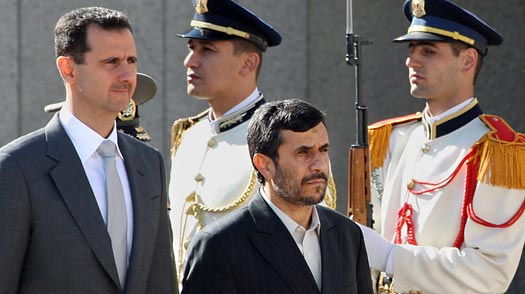UPDATES
AIJAC UPDATE – The political and moral costs of the failure to sanction Syria
October 7, 2011 | Tzvi Fleischer

Today’s Update looks at Syria, Iran and Turkey against the backdrop of the veto by China and Russia of sanctions by the UN Security Council against the Assad regime in Damascus for its ongoing violent crackdown against anti-government protesters. The resolution was supported by nine members but, significantly, Lebanon, which occupies a temporary seat on the Security Council, abstained from the vote, as did South Africa, India and Brazil. After the vote the EU indicated it intended passing its own sanctions against Syria. Meanwhile Turkey’s PM Recep Erdogan continues to use the Syria issue and relentlessly attacks Israel for his own regional ambitions. We offer a number of articles that reveal the changing dynamics in the Middle East that are are not receiving sufficient attention in Australia and elsewhere.
First up, Michael Young, opinion editor of Lebanese newspaper The Daily Star, suggests that the failure to pass the Syria resolution exposes once more the Obama Administration’s reluctance to use its influence with its allies. He criticises the “cravenness” of Russia and China for articulating supposed humanitarian reasons to veto the resolution, and looks at the longer term implications of the veto. To read this article, CLICK HERE.
Next up, in a piece for the Washington Institute for Near East Policy, Asli Aydintasbas, columnist for the Turkish daily Milliyet, explores Turkey’s interests in pushing for UN sanctions against Syria. Aydintasbas explains the where Syria has fitted in over recent years in Turkish ambitions to reassert the past glory of its Ottoman dominance. A post-Assad government will likely reflect the country’s Sunni majority, as opposed to the current stranglehold on power by the minority Alawite sect that Assad belongs to, which many Sunnis regard as heretical. This would be a better fit for Turkey, which is also predominantly Sunni. To read this article, CLICK HERE.
Finally, analyst Michael Ledeen makes the case that no sensible observer could doubt that Iran and Syria must be viewed as one single strategic problem. He points out how Iran’s Supreme Leader has ordered “all-out military, financial, and intelligence support” for the beleaguered Assad regime in Syria. A responsible foreign policy approach, Ledeen writes, would aim to weaken Teheran’s ambition for regional hegemony by breaking the long-standing alliance between the two regimes. But he believes this opportunity is either not fully understood or supported, particularly by the US Administration. For this timely analysis of the overarching geopolitical structures and power struggles in the Middle East, CLICK HERE.
Readers may also be interested in:
Former US ambassador to the United Nations John Bolton on the implications of the death of top al-Qaeda leader Anwar al-Awlaki.
Terror financing analyst Avi Jorisch writes in the Jakarta Post on the increasing trade between Iran and Indonesia and the continued satellite broadcasting by Indonesia of Hezbollah’s TV station al-Manar.
Isi Leibler explains why the US condemnation of the announcement of the planning for houses in Gilo is so problematic.
Elliot Abrams expressesAssad regime in Syria is threatening rocket attacks against Israel in the event of foreign intervention against his regime.
Manfred Gerstenfeld details Turkey for its hypocrisy in conducting cross-border raids into Iraq to target those it regards as Kurdish terrorists, while criticising Israel for better-warranted attacks against Hamas in Gaza.
Richard Goldstone, of the infamous report into Israel’s Operation Cast Lead against Hamas in Gaza, is now chairing a committee to vet candidates to be judges at the International Criminal Court, and Claudia Rosett warns that, once again, his anti-Israel bias may have grave results.





